One Year in Berlin
An Interview with Andrea Stolowitz by Henning Bochert
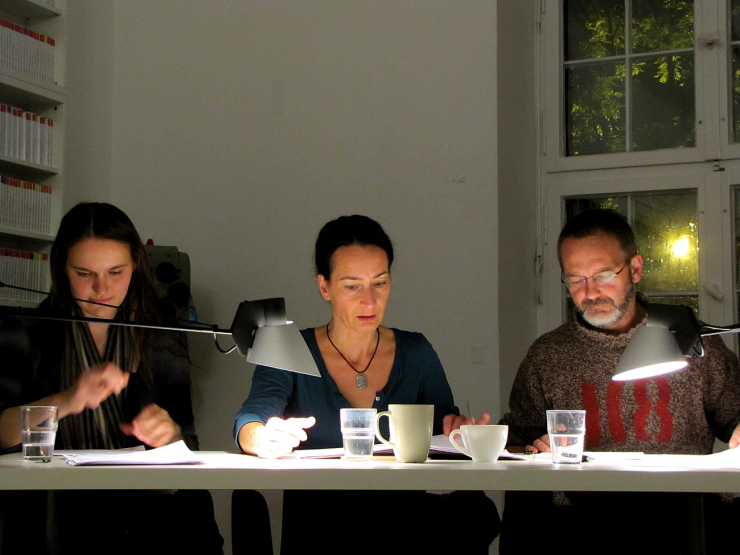
Henning Bochert: Andrea, after one year in Berlin you returned to your home in Portland, Oregon, this summer. As a writer-in-residence at the English Theatre Berlin International Performing Arts Center, you developed your new play Schlüterstrasse 27. You also spent the year experiencing the theatre offerings in Berlin. In our discussions, we confirmed that both our countries’ theatrical landscapes are different in many respects. It seems, however, that the situation for playwrights in both countries is changing.
Andrea Stolowitz: Yes. It seems, simply put, that in Germany dramatists have a growing interest in narrative storytelling and more realistic characters. I heard this described by German playwrights as the “British or American” model. This is not a return to the realm of naturalism per se, more like a movement away from the director/auteur model popular in the past twenty years in German theatre where the director’s job is to add his or her interpretation into the staging of the play. I think this method has divorced the playwright from some aspects of storytelling, which they would like to regain.
In the US, I think we are struggling to move away from the form of naturalism. We see more devised and experimental companies working with playwrights (The Civilians, Hand2Mouth Theatre, Wax Factory) and more and more playwrights venturing into more expressive theatrical works that call for an exploded theatricality beyond the text. It feels like the naturalism we inherited is less and less an apt instrument to describe the complexities of the world we live in.
Economics and Aesthetics
Henning: We will get to the impact of the so-called Regietheater on German playwriting, but our respective theatrical realities strongly differ in their economic aspects, too. How does the financial aspect factor into your work?
Andrea: Although the economic situation for US playwrights has improved post Outrageous Fortune, most of us still live in an insecure financial situation, which does affect the aesthetic quality of the work we produce. Since small cast naturalistic plays under 100 minutes are more marketable to audiences and cheaper to produce, we are more “rewarded” for them. Our struggle as playwrights can be seen somewhat as aesthetic versus financial.
Another example: In the US it is still in practice for theatres to commission plays with no guarantee of producing them. This is a problem because instead of granting aesthetic freedom it forces a marketable product. Most playwrights want to see their work produced and will write even unconsciously towards that end. There are theatres of course who commission and guarantee to produce, like Signature Theater in New York. When you read what their resident playwrights say, well, it’s amazing. They pretty much say that having a guaranteed production lets them write the kinds of plays they want to be writing that wouldn’t otherwise be written.
Henning: It sounds like a waste to me to commission and not guarantee productions. Of course there are plays commissioned by theatres in Germany as well, but the theatre will always, out of common sense, produce the play that has been written for it. Why else commission it in the first place, right?
Andrea: Well, yes. That’s the ideal model anyway to commission with guaranteed productions. But since new plays in the US tend to lose money and theaters are not as well-funded as in Germany there are financial considerations to producing the commissioned plays. Or so I have been told.
Henning: As a result of the history of the past 250 years, Germany’s theatrical landscape is largely made up of a rather unique web of public theatres built at central places in cities to be representational bourgeois palaces of culture as opposed to the exclusively feudal theatre of the past. Most funding comes from public sources, but while still few of the playwrights I know can depend on their writing alone, economic infringement on their aesthetic liberty would not be a consequence. In Europe, theatre is traditionally expected to be a means for public debate and society reflecting on itself. Even very experimental texts will be welcome for their very form and will most likely find a theatre and/or a director with an interest in producing them.
Andrea: Is that an explanation for what I sometimes experienced in German theatre? When it was obviously too experimental for a standard public audience? Theatre that turns into an elitist intellectual bubble? Didactic, boring, and heady.
Henning: Art and entertainment are traditionally understood to be essentially different things in Germany, and we can always learn from America that intelligent art can indeed be entertaining.
In the early 90s, it was the directors who took charge and expanded the artistic liberties of theatre to meet the demand for new aesthetics. In doing so, they assumed a very strong authorship during an era of very influential Regietheater (roughly: director’s theatre) in German theatre. Many of those impulses came from the Netherlands or from groups like Forced Entertainment from England.
For the playwright, however, this created extraordinary challenges. Many times, the playwright would find his or her text strongly modified with severe cuts or large additions. The deconstruction era of the aughts has weakened the playwrights’ position further, but it is exciting to see how they are now finding new means of writing to respond to that situation.
In Germany it goes without saying that for any director his or her task is to develop a vision for the text, while a US director has a much deeper, legal obligation to respect the text as written.
Directors and Playwrights
Henning: In Germany it goes without saying that for any director his or her task is to develop a vision for the text, while a US director has a much deeper, legal obligation to respect the text as written, right?
Andrea: Yes, this is true. And I like this. The challenge becomes for us dramatists how to place aesthetic considerations into the fabric of the text of the play. Can my text become more of a theatrical score and what might that look like?
I remember back in the 90s in graduate school, Chuck Mee taught me two significant concepts: One was that that you can take many artistic liberties with your play (moving it away from naturalism) so long as you set a signpost for the audience orientating them as to where they are in the play. The second idea was that we as playwrights can write down nonverbal theatrical moments and have them be important beats in the play. This was eye-opening because it meant there was a form that playwrights could create in besides text/scene/blackout/text.
Henning: US playwrights remain involved in the various productions of their plays. In Germany, you write your play, and then it is “out there,” being produced mostly without further involvement of the playwright except for the premiere or in the framework of a commission, of course.
Andrea: In the play’s world premiere I like being so involved with the production and want to be the one responsible for the text. The text is important to me and I do not believe that my role as a playwright is to turn my text over to a director for him/her to put a lens or another frame over it. When I create a text it contains the view and message that I want to explore. It feels to me mostly extraneous in the first several productions of a new play for a director to be adding a “layer of meaning” to my play.
That is different from say a play that is already in the canon, something where the director must put a lens over it because the relevant lens from 1560 or 1950 is no longer relevant or there have been so many productions that we want to see “so-and-so’s” version of the text.
The artistic integrity of playwrights are constantly infringed upon by the audience, producers, and other well-meaning voices who would actually be writing their own plays—so they say—if only they had the time.
But the playwright is also often in a vulnerable situation in the US. No composer will be questioned about why or how she or he employs this or that form or technique, while the artistic integrity of playwrights are constantly infringed upon by the audience, producers, and other well-meaning voices who would actually be writing their own plays—so they say—if only they had the time.
Henning: Yet another difference: I can't imagine anybody telling a German playwright how to write their play or to try to “fix” it like that. But back to aesthetics: what is your own relationship with realism?
Andrea: I maintain that just because I am a playwright, who creates text, with a vision of a whole story, that it must be contained within the aesthetic of psychological realism. I think there is a difference between having to write in the genre of psychological realism and between directors interpreting your work. I can write in a heightened genre and the director can still produce my text.
Henning: We are at a core difference here, Piscator’s and Brecht’s influences, a historical experience American theatre never had.
Darkness
Andrea: Despite the differences, there may be ways to bridge that gap. One of the outstanding plays that came out while I was in Germany was Wolfram Lotz’s The Ridiculous Darkness.
Henning: You read this play in Daniel Brunet’s English translation with your students. What was their reaction?
Andrea: They loved it. They were thrilled with its inherent theatricality and its playfulness. They had expected a philosophical boring nonsensical German tome—instead they got a modern story with a modern aesthetic.
One of the most interesting things about the play was how Lotz left room for the director’s vision in his play, but his play was also very specific in style and genre. If a director reads carefully and engages with the text and reads some of Lotz’s manifesto he/she could come to a very close realization of the play/production Lotz calls for in his writing. But it is not psychological realism. One does not have to do with the other.
Henning: Lotz’s The Ridiculous Darkness continues to be lauded as a play that remarries exploded theatricality and narrative. In his writing, Lotz integrates the historic changes and the aesthetic demands we mentioned, reassuming the position of the first visionary in the process without dictating anything. It is a good example for a text using a narrative but following a thematic rather than a realistic logic.
Back
Henning: Andrea, now that you are back, what strikes you most about theatre in Portland?
Andrea: Well, two things: 1) Most theatres do not have a bar or restaurant where audience members can congregate before and after the show. I miss having a time and public place to reflect about an artistic experience. And 2) In Germany audiences clap forever. The performers keep coming back and the whole applause ritual takes ten minutes. In the US, we clap briefly, the lights come on, and we go home. In Germany I was often annoyed with the epic clapping. Now I miss having some extra time to sit with the experience of the play, a transitional time between our play experience and our real lives. As a playwright I miss Berlin. It’s a gift to be in a place where the largest conversation about theatre isn’t how to save it from dying.

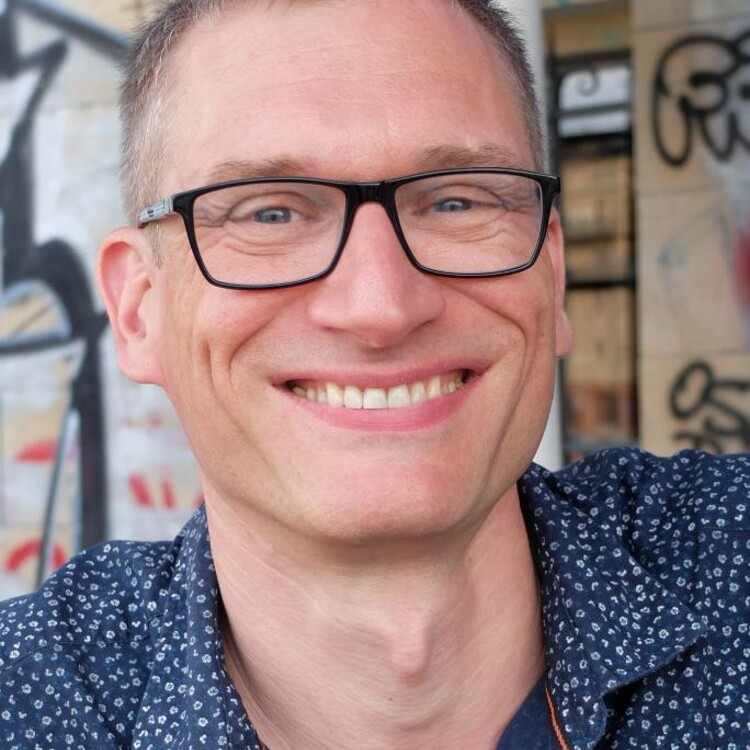
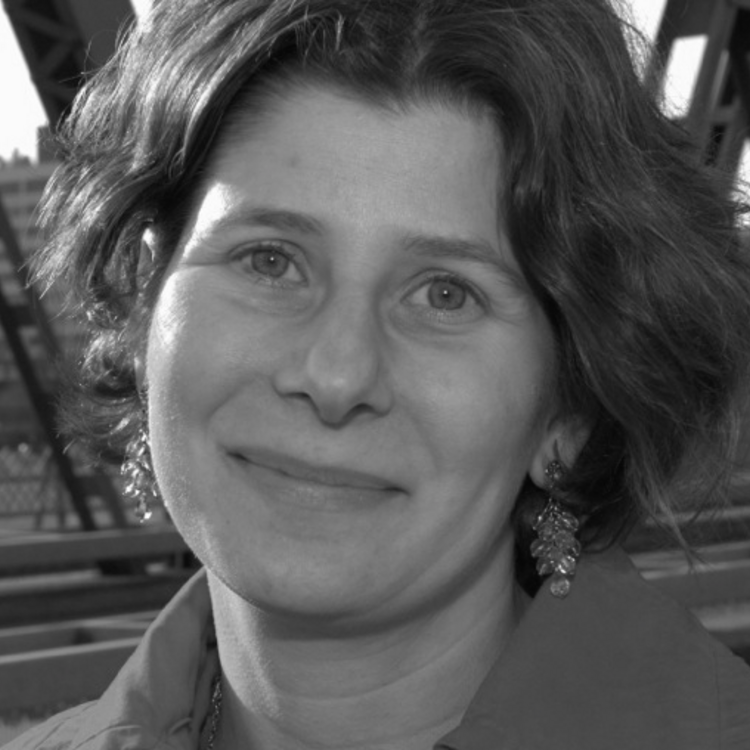
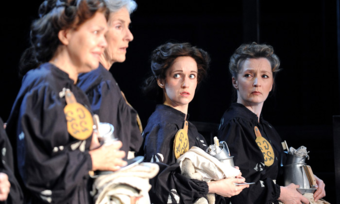

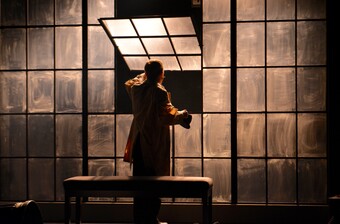

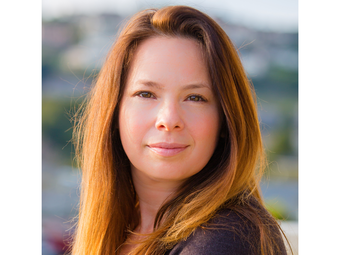

Comments
The article is just the start of the conversation—we want to know what you think about this subject, too! HowlRound is a space for knowledge-sharing, and we welcome spirited, thoughtful, and on-topic dialogue. Find our full comments policy here
Enjoyed this very much. As someone who has pondered and participated in the two cultural traditions for years, what strikes me the most in Germany is the audience (as is the case, I think, for you, Andrea, as your last points attest).
Germans take things seriously, often too seriously, according to the stereotype (where is their sense of humor is the joke, but there is also truth in stereotypes--lightness isn't their forte), but in the case of theatre, it leads to audiences (and critics) who have a real interest in what the play and production have to say. ie. Germans take theatre, like everything else, very seriously.
I think it's worth mentioning that every public theatre in Germany has a paid ensemble of actors and the audiences clap for them as well as for the other aspects of a production. And yes, in that time lapse when the clapping is taking place, the audience is also thinking about what they have seen and experiencing its affect on them.